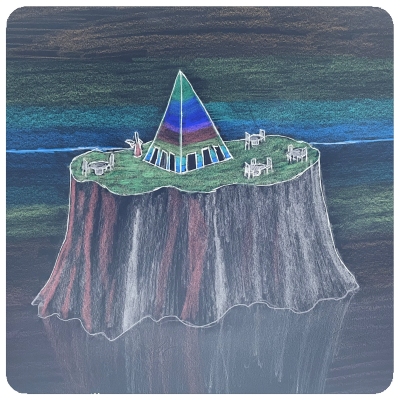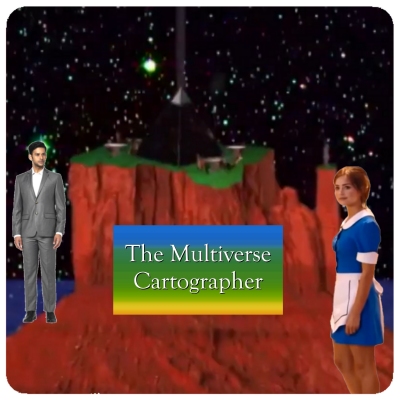
MVC Podcast 10:
The Creepy Man & The Barista
[00:49:01] February 10th, 2023
Charles Reuben gets to know Clara, "the omniscient barista."
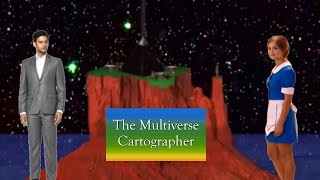
or

or listen through
or the RSS feed.
In today’s recital I’ll be reading the next chapter of “The Multiverse Cartographer,” called “The Creepy Man,” as well as one of the short stories, or chapters, from the first book in the Trilogy, that book being “The Small Grey Mouse and Other Short Stories,” and the name of the story is, “The Barista.” If you’re having a Mandella Effect experience right now, it’s okay. I revised the title of that chapter or story, it used to simply be called, “Barista,” where now it is called, “The Barista.” You’re not losing your mind, and this is, most likely, the same timeline as the one you were in yesterday, unless you yourself are a patron of The Coffeehouse.
I’ll get right to it. Without further ado: THE CREEPY MAN
Charles Reuben was relieved to be back in The Coffeehouse.
He walked back to the edge and looked out at the other islands. After a time, he sat at one of the tables beside a fire, and began writing in his journal.
“What happened to your cup?” Clara said from behind him.
Charles Reuben turned around, “What?”
“Don’t worry about it,” she said. “Can I get you anything to drink?”
“Water, if you don’t mind.” He noticed that she was now wearing a Ramones shirt and jeans.
She returned with his water, he thanked her, and she returned to the pyramid. When she left, he was alone on that island, but he could see other people on the other islands in the distance.
He inhaled the scent of clove, cinnamon, and seawater. He heard the familiar sound of whale song, and wondered if the whales were just a feature that his namesake had added, or if whales had their own doorways into this place.
He felt a presence to his left and turned to see a creepy man in a grey suit smiling at him. Charles Reuben’s neck-hair stood on end.
Charles Reuben said, “Hello.”
The creepy man said, “HELLO,” the same way, as if he were initiating the conversation as well.
The man approached the table, and sat down across from him, still smiling.
Charles Reuben was unsure what to do or say. He finally decided on, “How are you?”
The man replied enthusiastically, “I WANT TO KILL YOU,” and kept smiling.
Charles Reuben froze, unsure what to do or say.
After a long pause, the man said, “MAY I PLEASE KILL YOU?” still smiling.
Charles Reuben looked around for help, hoping Clara would return. He looked toward the central door of the pyramid, and the shimmering doorway vanished, revealing the sandstone interior. A wave of relief washed over him, as Clara approached them.
She arrived at the table with a smile and said, “Other translations of what he’s saying include ‘I want to mate with you’, and ‘I want to experience what it’s like to be you’. The Coffeehouse translated it that way so that you would understand that, were you to agree to what it is he is asking you for, your individual self would permanently cease to exist.”
“I understand,” Charles Reuben said, composing himself.
The creepy man was no longer smiling, he looked at Clara, then Charles Reuben, then Clara, confused.
Charles Reuben cleared his throat and said to the man, “I must decline. My name is Charles.” He reached across the table to shake the man’s hand.
The creepy man stood abruptly, his chair falling back behind him. He began bowing repeatedly saying, “I’M SORRY I’M SORRY I’M SORRY!” while walking backwards, out of a pyramid door that led to total darkness.
“Sorry about him,” Clara said, “we get all kinds here.”
“Can I ask you a few questions?”
“I can spare a few minutes, what’s up?” she said cheerfully, and sat down at the table.
Charles Reuben said, “I hope this doesn’t sound rude, but I’m very curious… are you a computer?”
Clara laughed and said, “Are you?”
Charles Reuben hadn’t thought about it. “I don’t… think so.”
“Aha, but you think!” she said playfully. “So do I. So, if Descartes is right, that means we are!”
“How old are you?”
Clara looked past Charles Reuben at the horizon. She said, “Do you see those islands out there?”
“Yes.”
“On every one of those islands, there I am. When we go to sleep at night, all our memories become one. Each one of us is equivalent to over sixteen thousand Earth-years old, but together,” Clara chuckled.
Charles Reuben asked, “What was it like here sixteen thousand years ago?”
Clara thought about it. “The first thing I remember, I thought I was an Empress. Then, I thought I was this revolutionary named Blythe.”
She looked out at the other islands and saw several other Claras looking back at them.
“Would you like to come inside?”
Okay, first I want to mention that some of the things happening in this chapter, as well as in the next one I’ll be reading today, are setting up for things that are going to be revealed in later chapters and recitals. So, I’m not going to explain everything, because I don’t want to spoil the experience of those future chapters when they come up. The creepy man does have a backstory and an important role to play, but I won’t be getting into that right now. I will briefly mention that The Coffeehouse makes everyone who isn’t human look human for humans. Whatever way these other beings communicate, The Coffeehouse translates it into a human talking, in the language most familiar to the person receiving the communication. In other words, if a big translucent blob being vibrates at you, The Coffeehouse might translate that into a person standing there saying, “Hello, how are you?”
“The Creepy Man” chapter begins with Charles Reuben relieved to be back in The Coffeehouse. Why is he relieved? Because he was just on Venus with Arthur and Joseph Fathom. It was his first time going to a place that was neither his home universe nor The Coffeehouse itself.
Clara asked him what happened to his cup. What’s going on here? It’s more clear in the original Interdimensional Coffeehouse podcast, and is never really clarified in “The Multiverse Cartographer” or in the Mouse books, but when Charles Reuben stepped through to Venus, you might remember, he was holding his chai, the cup and saucer. Then, he slid down the mountain, and woke up in the care of the Fathoms. So, what happened to his cup?
Well, I’ll tell you. Charles the Grey, centuries after Arthur and Joseph Fathom’s time, finds the cup while climbing Maxwell Montes one day. He is fascinated by it. There is no other cup like it on Venus. Also, Joseph Fathom, though he doesn’t share the story of Elizabeth and the Alien with his apprentice Carl, he does share the story of the time he met a man named Charles Reuben who was a Multiverse Cartographer from a place called The Interdimensional Coffeehouse. Charles the Grey, who you might remember from the first chapter was named after Charles Reuben, knew of this story, which by then was thought of as more of a tall-tale or a myth. But, after finding the cup that Charles Reuben had dropped that day, he concludes, correctly, that it must have been dropped by Charles Reuben the day he slid down the mountain and was rescued by Arthur and Joseph Fathom. Later in life, when he gets a certain gift from Jobe, it occurs to him that he might be the one who creates The Interdimensional Coffeehouse.
Clara, who is sometimes called “The Omniscient Barista,” which isn’t far from the truth, already knows this, and when she asks Charles Reuben about his cup she’s having a little inside joke with herself. On another level, she’s calling his attention to the fact that he left with a cup, and didn’t return with one, and that he should be more careful with the dishes from The Coffeehouse.
Charles notices that Clara is wearing a Ramones shirt. What Clara is wearing starts to become important, moving forward, as it helps him to distinguish between one Clara and another. Of course, there are the Trigintasex numerals, which are useful for knowing which Coffeehouse island you’re on, and therefore which Clara you’re talking to, but if you’re traveling between more than one island on the same day, and you don’t have the time to stop and examine the numerals, you can just remember what the Clara on that island was wearing.
Charles Reuben inhales the scent of clove, cinnamon, and seawater, drawing us further into that world. At this point… I mentioned in a previous recital that there was more to say about The Interdimensional Coffeehouse, and that I would do it later. I suppose now is as good a time as any.
Briefly, when I was a 20-year-old Hierus, the one who guards the temple in the west, I used to have dreams, pretty regularly, of demons of various kinds that I needed to battle in various ways. Sometimes it was a matter of throwing energy at them and dealing with whatever they threw at me, and other times it was a matter of elevating my own vibration so as to become invisible to them. Once, it meant flying up into the starry sky and invoking Thoth, then diving down to defeat a group of invisible bad guys around a swimming pool.
One particular night, there was a sort of tournament. I was up against one after another after another. After defeating what seemed to be the final boss, I floated upward into a kind of white zone. I briefly lost my conscious awareness, and when things came back into focus, I was standing on a residential street. I knew I was still dreaming, and began doing my usual tests to confirm it.
From the time I was 6 years old, my primary test to see whether or not I was dreaming was to look at a sign, or a printed word, then look away or close my eyes, then look at it again. Every time, the word would change. If I looked at my digital watch and saw it was 8:30, then looked away and looked back, it might say something like 5FQ.
So, I looked at the street sign there, closed my eyes for a few seconds, and opened them again, but the street name didn’t change. This blew my mind, as I was certain, beyond any doubt, that this was a dream, but the dream wasn’t following the rules.
I found a map on a wall of the city I was in, closed my eyes and looked again. I did this several times, but even the complex map remained the same. I had to find out how this was possible, so I found my way to the main city center, and went into a kind of capitol building, or city hall.
I saw a machine there, and stood for a while trying to memorize every detail, so I could draw it when I awoke. I saw a ballroom full of people dancing, and somehow “knew” that, in their waking lives, these people spent the majority of their time hunched over computers.
I was eventually able to talk to the woman who seemed to be in charge of the city. She was very concerned, asking me how I had gotten there, saying I didn’t belong there. She explained that the city was kept intact and solid, exactly as it was, through the collective will of the Sea-Org, the upper echelons of the Church of Scientology. She swore me to secrecy (oops) then told me I had to leave.
Some people walked me to the Delta Flier from Star Trek Voyager. I boarded it alone, and it lifted off automatically, and up into the sky. As I looked back at the city, I saw that the city was its own small planetoid, a spherical word just big enough for the city, far smaller than any moon. It was more like a small asteroid, but spherical, but the gravity was like the Earth’s. It being the Astral Plane, there was no need for it to adhere to our laws of physics, of course.
As I looked ahead to where the Delta Flier was taking me, I saw what appeared to be The Enterprise D, though it might have been any 24th century Galaxy Class starship, I suppose. As soon as the Flier reaching the docking port, I woke up in my bed.
Needless to say, this dream had quite an effect on me. Or, at least, it stayed with me for a very long time. Shortly afterward, I read Scott Peck’s novel called, “In Heaven As On Earth.” In it, there was a similar concept put forth. Spoilers ahead for that book by the way, the protagonist dies in the beginning. He finds himself in a room, which he later finds to be part of a complex, many rooms connected by hallways. He learns that this place is kind of sort of equivalent, a little bit, to the idea of purgatory. It’s a waiting area for souls to get used to no longer having a body, and to receive a kind of orientation before they can move on, if they can move on, to a higher level where they work in harmony with other souls, the collective of their harmonious designs being, in a sense, God. Scott Peck was Christian, but he had some pretty far out ideas.
In the book, he asks his guides how that place came to exist. It is explained to him that the place is being constantly willed into existence by a sort of committee of souls that have graduated beyond it. Their collective will for it to exist allows it to remain solid, exactly as it is, to serve as a tool by which recently the deceased can get their bearings.
With both the dream and that book in mind, when I made the final revisions to “Second Fruit” I described the room that Joe, Luke and Lucy interact in with the words, “Here, in this place, things were solid like on earth. Somehow, those that came and went from this place were so very fixated on things being the way they were there, that the place never changed form, never faded away.”
I imagined, or maybe reasoned, that these fixed places could be brought into being intentionally, or unintentionally, for a purpose, or for no purpose at all. Here’s an example, do remember your old high school? Do you remember where you had lunch, the tables, and what was around you? See, that place is solid, for you. If I had to guess, I’d say that you’ve probably had at least a few dreams take place in that setting. Back in the cult, as well as in ancient Greece, we would intentionally build palaces, temples, and buildings of various kinds within our minds, for various purposes.
With all of these things in mind, in 2003 I wrote the part of “The New World Empire” where Charles the Grey creates a Coffeehouse with the form of mirrored pyramids on islands. At the time, I was doing my best to make it ambiguous and unclear whether this was a virtual space, which is pretty boring, lame and derivative, or an astral space, which I felt would be more intriguing. After I wrote that chapter, I wanted it to be seen, visualized, and thought about my so many people that it would become one of those places that exist in a solid state in the Astral.
Imagine you were at the Great Pyramid at Giza, standing in front of it, looking up at it, from beside your camel. See? Even if you’ve never been there, that image is solid, unchanging. You could easily visit it in a dream, a daydream, or a guided pathworking.
With this in mind, I changed the name of my website from “Second Fruit” to “Gwydion’s Astral Coffeehouse,” and created a YouTube Channel and Facebook Group with the same name. The Facebook Group’s description read, “Gwydion's Astral Coffeehouse is located in a plot graciously donated by the Lincoln to improve local morale and enhance aesthetic and diversity in the mid to lower astral plane, and can be reached by way of any door. The first time you visit The Coffeehouse, you must first create it. To do so, in your mind's eye, simply activate the "Ocean" presetting. Smell the salt water in the air, feel the mist. Good. As if you're standing on a beach, but there's no beach, just water in all directions, and you're hovering above it. Good. Now proclaim, ‘Let there be mountains arising from the waters! Thin ones, almost like cones, but not quite. 30 of them. No, 150! Spaced throughout the... yeah! Perfect. Now, erase everything in this grid higher than 50 meters, except for me of course, and the stars, nothing inhibiting their light. Let the flat tops of these mountains be coated with marble. No, malachite! Increase malachite luminosity by fifteen percent, and let there be pyramids at the centers of each of them with a diameter that allows for a minimum of two meters of floor space before the drop off, and let the pyramids be made of sandstone bricks. Smaller bricks. Mirrors! That's better. Let there be three portals on each wall of every pyramid, and let one on each be open to one other pyramid such that they all be connected, and let the remaining doors lead to the most popular public areas in the Astral at any given moment, with the option for the customer to command the door to his or her own home or to a destination of their choosing, which is either public or where he or she is invited. Now place elegant, appropriate for coffee houses, tables and chairs throughout the floor space. No, like the inside of a coffee house. Better. If someone jumps off of the edge, let them hover or fly. Actually, make the sky change according to the time of day in real-time terra, Los Angeles, and the color saturation of the sky, and the ocean, and of everything here except the people who come and go, exaggerate it by a hundred fifty percent.’ Good, you're here. Welcome. Due to underdeveloped technology, visitors must provide their own coffee.”
“Gwydion’s Astral Coffeehouse” the YouTube channel and the Facebook group are both still there, if you want to search for them, but I’m not as active on them as I used to be.
So, now you know my secret. Some publish from a desire for fame and fortune. Me, I want to be able to visit The Coffeehouse long after I shuffle of this proverbial Shakespearean cliché, even if I lose consciousness, or lucid awareness, for a period of time, a sort of safety net made from the collective visualization of others, and then to use it to travel anywhere I wish in the Astral, from heaven to hell, to 1920s Paris, or Superman’s Fortress of Solitude, the 80’s version, or Dune, the 80’s version, of course, always the 80’s version.
So, 12 years after writing the bit about Charles the Grey creating this maybe Astral Coffeehouse, 12 years in which I used The Coffeehouse as a devise in various forms of art, I finally decided to begin writing about The Coffeehouse as it was originally, created by Charles the Grey in The New World Empire story.
This meant a few things. It meant that, at least in that context, I had to more or less commit to it at least originating in Virtual Reality. However, if it was to be interdimensional, it requires too much suspension of disbelieve to think of is as a Virtual space, then one might assume that all of the words one visits through the doors on the pyramid are also virtual. Then again if it were Astral, one might assume one could not pass through one of its doors and arrive in any kind of physical realm. At first, what I went with, was that it originated in Virtual space, but that Charles the Grey, being Venusian, was somehow able to “find a way” to allow the pyramid doors to access other dimensions. Later, in 2022, when I was publishing it for the first time, not counting the podcast, I was able to tie in the divine aspect of Jobe as being the incarnation of Luke, son of God and the devil, to add a mysterious element to the otherwise hard science fiction story. This came in the form of “The Rectangle,” which we’ll get to in a future chapter by that name, in a future video recital.
You’ve heard me mention Gordon. Back in 2014, every week I would go to Gordon’s and watch Doctor Who. Those were the Clara years, with Matt Smith and then with Peter Capaldi. You might remember The Tardis can translate things into English, like the universal translator on Star Trek, and the Babelfish in Hitchhiker’s Guide to the Galaxy. It can also travel through time and space, but not dimension. Somehow, toward the end of 2014, Clara appeared in my mind in the form of something The Coffeehouse had never had: A Barista.
From there, the Interdimensional Coffeehouse began to take form. First, it was to be a novel. I wrote the first chapter, everything from Charles’ parents introducing him to The Coffeehouse, them disappearing, Charles returning as an adult, meeting Clara, learning Trigintasex from Isaac, up to him sliding down the mountainside on Venus.
I printed the chapter out, went to Gordon’s, and read it to him. Remember, he was the owner of the coffee house in Pasadena in the 80s and 90s which had inspired the form of the idea to begin with. He was so excited about it, that first chapter. He was raving about how much he loved the idea.
Then I told him, “I’m running into a problem with it though… I want the doors to be able to take Charles anywhere at any time, but if the laws of physics are different in another universe-type, how will he be able to exist there?” He reprimanded me, “Let go of these meat bodies! You are an omniscient all-powerful being! If you want to go somewhere, just go! Why do you have to drag your body along with you?” I took his words to heart. He was passionate about these kinds of things. We had some weed and whiskey, talked and laughed some more, then I gave him a hug and left.
Later that night, he went to bed, but he didn’t lay down, he sat up. In the morning, his friend checked on him, saw him seated upright in his bed, and asked him if he was awake. He made a sound, so his friend figured he’d let him sleep a while longer. When he came to check on him later, he was gone. I mean, his body was still there, but he was no longer with us. It was a difficult time, as he had been such a dear friend and a guiding light for me for so many years. It seemed that, like the stories of the Buddhas and many great masters, he had chosen the moment of his departure from this world.
So, next we read that Charles heard the familiar whale song in the distance. The whale song is a reference to Chapter one verse one of my dad’s book, “Transformations:”
“I saw the rainbow starsky. Not with my earth eyes, with my brainfire that is itself a star. Deep lightspears faceting from suns and stars and darkblue space dancing through high mountain air.
I rose a lightcloud of no particular shape toward the skyhome above green earthmountains, and the cities rock-frozen, flesh-frozen. And suddenly it was all white light. They came from the white light to me in the white light. They messaged my lives to me, and the paths I had walked and would walk.
They messaged love in rainbows and dark music lightshattering skyfoam, like space soap. The sky was orange; then deep blue, and the mountains were beneath me.
Flesh people often call them saints and devils and gods. I call them friends. They messaged voices and tastes and smells and images and worlds and words and screeching sounds and the songs of The Great Whales in the sea, our Brothers and Sisters.”
The sound you hear, along with the thunderclap, at the beginning and end of these videos is specifically Humpback Whale song. It’s also at the beginning and end of the episodes of “The Interdimensional Coffeehouse” podcast of 2015 to 2017, as well as those of the old “Gwydion’s Astral Coffeehouse” YouTube videos, and the old “Gwydion’s Artwalk Videos.” It being Humpback Whales is a reference to, and at the same time “Transformations,” and Star Trek IV.
So, at this point, Charles Reuben meets “The Creepy Man.” He’s kind of the stuff of nightmares. He repeats Charles Reubens’ words back to him, and there’s something off about him. Especially when he starts asking, in all caps, for permission to kill Charles Reuben.
At this point, Clara comes out from inside the pyramid, where she seems to live. Omniscient as she seems to be, especially when it comes to things happening at The Coffeehouse, she knows what’s happening, even though she was out of earshot at the time. She also understands that The Coffeehouse translated The Creepy Man for him in a particular way, and she knows what all was said. It’s almost as if she is part of The Coffeehouse, or The Coffeehouse is a part of her. I’m moving quickly through some of these mysteries, as they’ll be further expounded in the chapters we haven’t read yet.
After The Creepy Man awkwardly apologizes and leaves, Charles Reuben asks Clara if she is a computer. She says, “Are you?” Not really committing to an answer. Again, we’ll get into how Clara came to be later, in this story I mean, not the Doctor Who thing. That’s more metatextual, but she has an origin that’s explained in a chapter we’ll read later.
She explains that she is on every Coffeehouse island, and that when all the Claras go to sleep, their memories of the previous day are shared with all of the others. While they’re awake, they are separate individuals, and they’re aware of their own individual pasts as differentiated from the pasts of all the others, but there isn’t any privacy among them once they go to sleep and wake up again, as far as their thoughts, feelings and actions of the previous day. She explains that each of them has been alive, as The Barista, for 16,000 years, but having a collective memory of 8 septillion of them having been alive for that long… I’ll let you do the math, but it’s safe to say she has more memories than the universe itself, and all of them take place on that island, or inside her pyramid, getting drinks for people. Sounds like hell, maybe? Or maybe not. She seems to be happy enough.
Charles Reuben asks her what it was like in the beginning of The Coffeehouse, and she tells him that at first she thought she was an Empress, then she thought she was a revolutionary named Blythe. Now, these two chapters, “The Creepy Man” and “The Barista” which I’ll read soon, were originally three episodes of “The Interdimensional Coffeehouse” podcast, called “Clara,” “Clara’s Story,” and “Clara’s Room.” In the middle episode, “Clara’s Story,” she tells Charles Reuben the story of how she came to be. The story involves Charles the Grey, Blythe, and Simon, and is included in “Smaller Mouse” in the chapters called “The Rectangle,” “Simon,” and “Palace Three.” We’ll read those chapters later on in this series, but just so you know, to help things make sense going forward, at this point in the story there was a huge information dump. Charles Reuben learned about Clara’s birth, background, and a bit about Blythe, in whose image Clara was made.
In the original podcast version, she cries at the end of telling him her story, and he wipes her tear. Then she asks him, “Would you like to come inside?”
Now is a good time for us to read the short story called, “The Barista” from “The Small Grey Mouse and other short stories.”
THE BARISTA
(Two Nights Ago)
“Would you like to come inside?”
Charles Reuben asked, “Inside... where?”
Clara gestured with a glance toward the Pyramid.
He said, “Oh, I didn't realize I could go in there!”
She said, “Normally we don't invite people in.”
Charles looked toward the horizon, to one of the other pyramid islands in the distance. He noticed that the Clara there, who was wearing a sparkling green dress, was staring back at them with binoculars.
This Clara, the one on this island beside Charles, said, “She's a nosey one.”
Charles followed her toward the pyramid. The beach scene on the other side of the door vanished, and for the first time he saw the pyramid’s interior: a hallway of sandstone bricks.
After they passed through, the door behind them was replaced by a brick wall. He saw the light was flickering and, further down, noticed torches on the wall spaced throughout. He realized that the hall was longer than the pyramid was wide.
Clara turned and walked up some stairs, and Charles followed.
She said, “Each of us decorate our bedroom differently, and we redecorate often.”
She reached the top of the stairs and pushed open a door revealing a predominantly mauve and white room. There was a desk and chair, a waterbed, and a closet. On the walls were posters for bands Charles had never heard of.
“When we wake up in the morning, we each know how all of the others have redecorated.” She sat on a waterbed and gestured for Charles to sit on the chair by the desk.
She said, “We redecorate so the others won't know what our rooms look like for the rest of the day. It's like a kind of privacy, I suppose. It's silly, since we'll all find out later anyway, but… I don't know.”
“That's really interesting!” Charles said.
She said, “Why do you say so?”
He said, “You're all one being… but you pretend to be separate for a while?”
She seemed uncomfortable with that idea. “No, I wouldn't put it that way.
“We're each like a kind of twin. You'll experience this too, later. Each of us are independent, but we’re all from the same… like an address. I don't like to call it a program, but that's the easiest way to explain it.”
Charles said, “Blythe didn't like the idea of a computer sounding too human.”
Clara was a bit taken aback by this insight. “No, she didn't. You're right.”
"Do you think of her in the first person?"
Clara was already nodding affirmatively, “Yes, I do.”
"What happened to Blythe?"
“It's still happening.”
Charles thought about it. “What?”
“There are several variations, of course.”
“Of course… what?”
She laughed. “Up until the moment that Simon created me, that timeline is set in stone, from The Coffeehouse's point of view.
“But after that, there are several branches. Sometimes I catch one, on the other side of one of the doors, still going on somewhere.
“I see myself out there fighting, on an ice planet, leading an army of bluebirds, sometimes dying on the battlefield.”
Charles Reuben sat down on the bed beside her, and put his arms around her.
She melted toward his chest.
For the first few months of writing “The Interdimensional Coffeehouse,” which by then had become a podcast, I was resisting having Charles Reuben and Clara become romantically involved. It seems such a cliché to have the male and female lead become romantically involved, and I wanted to remain in that kind of woke-space of having them just be friends, like Murphy and Lewis in Robocop.
I was writing each episode fresh, not really knowing where it would go in the next episode. After Clara had shared her life story with Charles Reuben, I decided to go ahead and go where I had been resisting going. The original episode of this part didn’t stop with her melting toward his chest, and read a bit like the pornographic parts of a romance novel. After a few weeks, I edited that part out and re-uploaded the episode, embarrassed to have the play-by-play narration of what happened next out there where people can hear it. I decided, retroactively, to have it tastefully cut to the next scene at that point, like in old movies where the camera pans away from the couple and lets the viewer’s imagination fill in the details.
But, getting back to the beginning of this chapter, you might recall that just after the title were the words, “Two Nights Ago.” This was because in “The Small Grey Mouse” there had already been two chapters which took place two days after this. Reference had been made, kind of subtly, to this having happened. So, if one was reading “The Small Grey Mouse” in order, it would be important to know that this part of the story had happened two nights prior to what the reader had most recently read about Charles Reuben and the Claras. Remember, after this happens, all 8 septillion of the other Claras would know about it, even have the memory of it, but they would know that it wasn’t them that had this experience but, rather, the Clara with the Ramones shirt, who decided to dress as a 1960s roller-skating waitress the next morning.
For the fans of Doctor Who, you might enjoy knowing that this episode was written in April of 2016, several months after Clara’s last episode, basically, in which she flies away with Arya Stark in a Tardis disguised as a road-side café. You might remember, Clara was wearing that blue waitress outfit. That’s basically what I had in mind when writing this chapter. Small correction, she hasn’t put on that outfit yet, she does that when she wakes up in the morning.
Moving along, Clara invites him inside. The pyramid, ya perv, though the double-entendre wasn’t unintentional. Charles says he didn’t realize he could go in there. You might remember that when Clara goes through the pyramid doors, the shimmering portal to another world vanishes, and you can briefly see inside the pyramid itself. Until now, Charles Reuben assumed that only Clara could go in and out of the pyramid itself, while all of its patrons could only enter or exit The Coffeehouse realm through the shimmering rectangular portals.
She clarifies that she can invite people into the pyramid, but they, meaning the Claras, usually don’t.
Then there is the nosey Clara on another island which they catch watching them through binoculars. That other Clara is wearing a sparkling green dress, which you should remember. It might come up later.
She shows him to her room, and she explains that they redecorate their rooms upon waking, since every morning they all wake up knowing what each other’s rooms looked like on the previous day. To maintain a sense of separation, of individuality, they change things around in the morning so that for the rest of the day none of them will know what the personal space of the others looks like.
Charles Reuben finds this fascinating, and makes the error of saying they’re all one. She says they’re not all one, and tells Charles Reuben he’ll understand what it’s like later. A bit of foreshadowing there.
Clara has difficulty saying that she and the others are all manifestations of the same program. Having heard so much backstory, including the story of Blythe, while they were sitting outside, Charles Reuben understands this. Her basic nature is the same as Blythe’s was at a particular place and time, and Blythe’s interface with her Free World apartment spoke to her in a computerized voice, since she didn’t like the idea of a computer sounding too human.
The rest of the chapter, their conversation, is pretty clear. There’s no need for me to repeat what they said. I’ll just point out that when Clara says that sometimes she sees herself leading an army of Blue Birds, or on an ice planet dying on the battlefield, this might sound familiar from the timeline, especially “one particular timeline” which ends with her dying in battle on Ganymede, fighting in “Lucy’s War.”
The next chapter in “The Multiverse Cartographer” is called, “New Ancient Land.” To set up for that one, I’ll first read a few chapters from “Smaller Mouse” called “Blythe,” “The Rectangle,” and “Simon.” Then I’ll read “New Ancient Land” from “The Multiverse Cartographer,” and finally, “Palace Three” from “Smaller Mouse.” It’ll be another longer episode, but it will all take place within The New World Empire universe, with only a little bit of an overlap with The Interdimensional Coffeehouse.
Until then.
[Note: The term “Metatextual” has been defined by Gérard Genette as “text that refers to another text,” one of his five categories of “Transtextuality.”
Edward, however, is using the Greek prefix “Meta-” to mean “behind” or “beyond” as in the reason or inspiration for, or what is behind, the text, not referring to Gérard’s usage of the word. Edward differentiates this from “Subtext,” or meaning which is intentionally implied by the text.]
 |
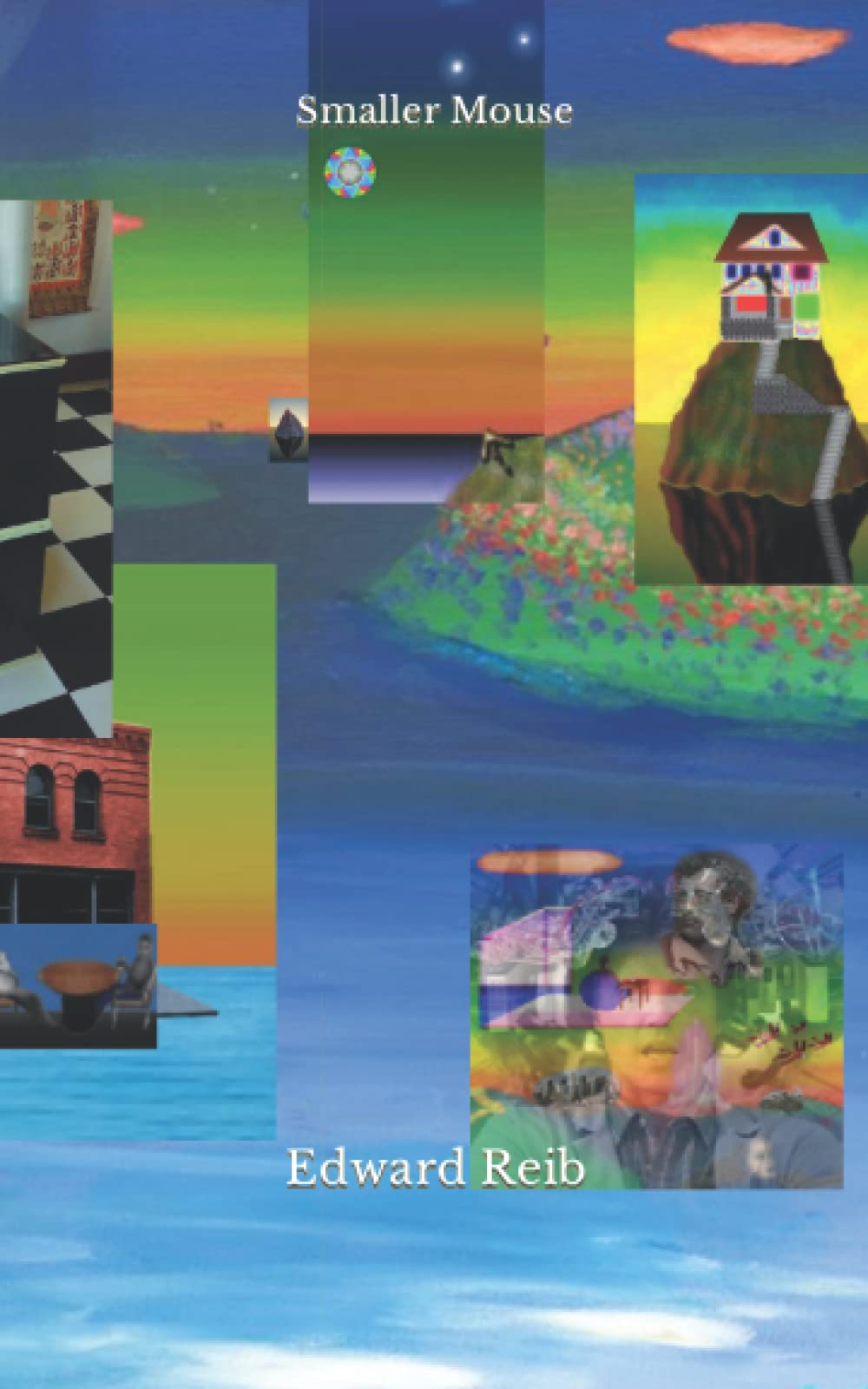 |
 |
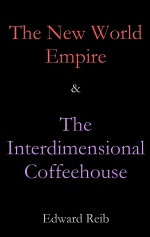
|
 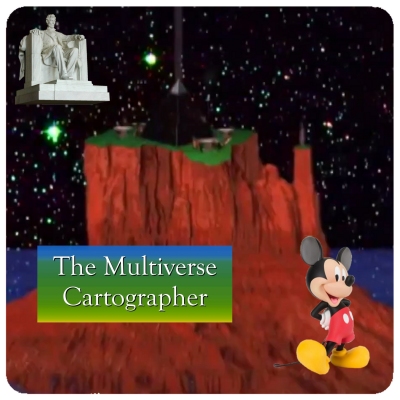 |
 |
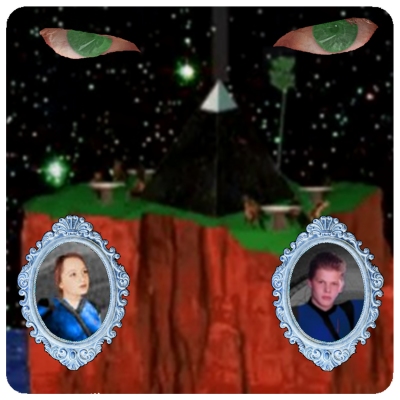  |
